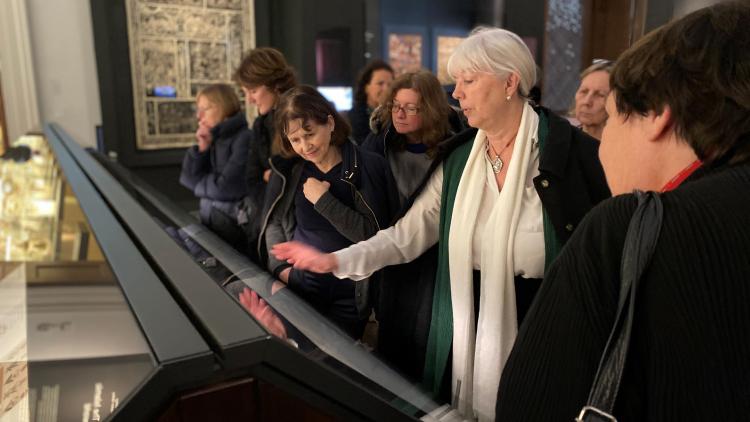BA Korean


Key information
- Start date
- Duration
- 4 years
- Start of programme
- September 2025
- Attendance mode
- Full-time
- Location
- On Campus
- Fees
-
Home: £9,535
International: £22,870 - Course code
- T415
- Entry requirements
-
ABB
Contextual: BBB
-
See undergraduate entry requirements and English language requirements for international and alternative entry requirements.
Course overview
The BA Korean programme provides you with the highest level of competence in all aspects of the written and spoken language, as well as an introduction to both classical and modern Korean culture - from the study of pre-modern Korean literature and history, to contemporary Korean cinema and TV.
The BA Korean is suitable for both absolute beginners as well as those with some knowledge of the Korean language. Students will spend the third year of study in Korea furthering language proficiency and understanding of the local business practices and culture.
Why study Korean at SOAS?
- We are ranked 13th in the UK for Modern Languages (QS World University Rankings 2025)
- We are ranked 6th in the UK for Asian Studies (Complete University Guide 2025)
- Gain essential language skills but also an in-depth understanding of the region’s culture covering subjects from literature, history, cinema, and politics
- Spend your third year in Korea furthering language and cultural proficiency
- Flexibly structure your programme using our central options modules to take advantage of the expertise of our other departments
Structure
Students take 120 credits per year composed of core and guided modules, which allows for students to design their own intellectual journey while maintaining a strong grasp of the fundamentals.
- Year 1: students concentrate on language study complemented by introductory modules on history and culture and academic writing skills.
- Year 2: students will take further modules on language and history/culture.
- Year 3: the third year will be spent at a university in South Korea where the focus will be on intensive language training.
- Year 4: students will further their language skills and take modules in history/stroke culture and write an independent study project.
Important notice
The information on the website reflects the intended programme structure against the given academic session. The modules are indicative options of the content students can expect and are/have been previously taught as part of these programmes.
However, this information is published a long time in advance of enrolment and module content and availability is subject to change.
Year 1 - K100 pathway - Core
Year 1 - K200 pathway - Core
30 credits from List A
Year 1 - K100 pathway - Compulsory
Year 1 - K200 pathway - Compulsory
Year 1 - K200 pathway - Guided options List A
Year 1 - K100 pathway - Guided options List A
30 credits from List A
Year 2 - Core
If K100 was completed in Year 1, please select K200. If K200 was completed in Y1, please select Korean 4.
Year 2 - Compulsory
Year 2 - Guided options - List B
30-60 credits from List B
Year 2 - Guided options Language
Up to 30 credits from Languages
Year 4 - Compulsory
Teaching and learning
Modern language teaching involves classroom work and independent study. A few non-language modules are taught through a formal lecture. The single and combined degree programmes are examined through oral and written examinations and coursework or reports.
Contact hours
All full-time undergraduate programmes consist of 120 credits per year, in modules of 60, 30 or 15 credits. They are taught over 10 or 20 weeks. The programme structure shows which modules are taught over one term or the full year. It also shows which modules are compulsory and which are optional.
As a rough guide, 1 credit equals approximately 10 hours of work. Most of this will be independent study. It will also include class time, which may include lectures, seminars and other classes. Some subjects, such as learning a language, have more class time than others.
Year abroad
All students spend their third year in South Korea at one of the universities listed below, following successful completion of their second year. Students indicate preferences, but final allocation will be determined by the department.
- Korea University
- Seoul National University
- Sogang University
- Kyung Hee University
- Pai Chai University
- Kyemyung University
SOAS Library
SOAS Library is one of the world's most important academic libraries for the study of Africa, Asia and the Middle East, attracting scholars from all over the world. The Library houses over 1.2 million volumes, together with significant archival holdings, special collections and a growing network of electronic resources.
Fees and funding
Fees for 2025/26 entrants per academic year
| Programme | Full-time | |
|---|---|---|
| Home students | Overseas students | |
| BA, BSc, LLB | £9,535 | £22,870 |
| BA/BSc Language year abroad | £1,385 | £11,430 |
See undergraduate fees for further details.
Employment
Graduates from the Department of East Asian Languages and Cultures develop competencies in intercultural awareness, analysis and communication. Demand for specialists with advanced proficiency in the languages of China, Japan and Korea has significantly increased in recent years, and graduates with these skills are highly sought after by employers.
Recent graduates have been hired by organisations including:
- Accenture
- Amazon
- Bloomberg LP
- Department for Work and Pensions
- European Alliance for Human Rights in North Korea
- European Commission
- ITN
- Japanese Government
- Korea Trade Centre (KOTRA)
- KPMG
- Mizuho Bank
- Nagahama Board of Education
- Nanjing Museum
- Pinsent Masons LLP
- PwC
- Seoul Metropolitan Government
- Shelterbox
- UNDP
Find out about our Careers Service.



